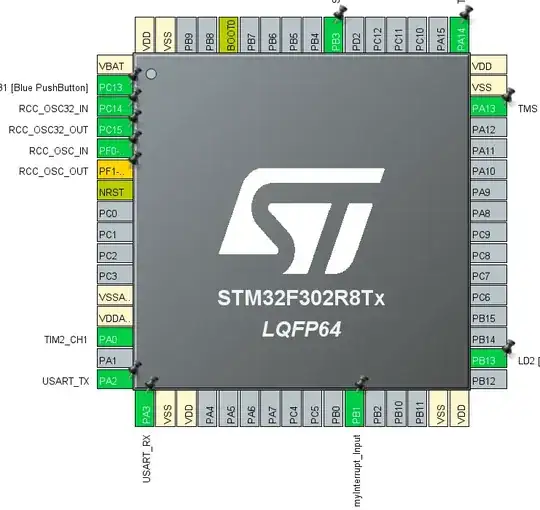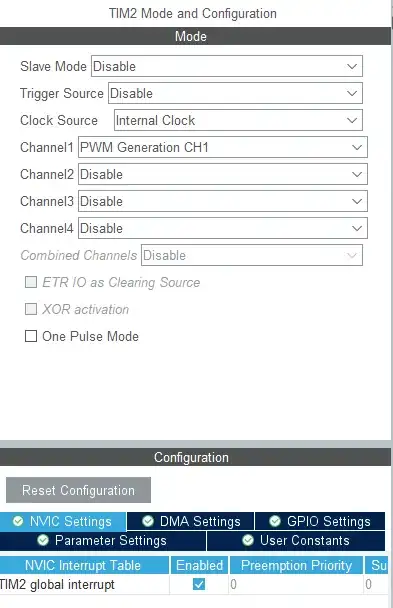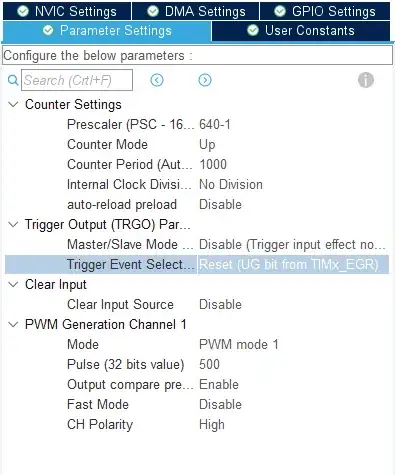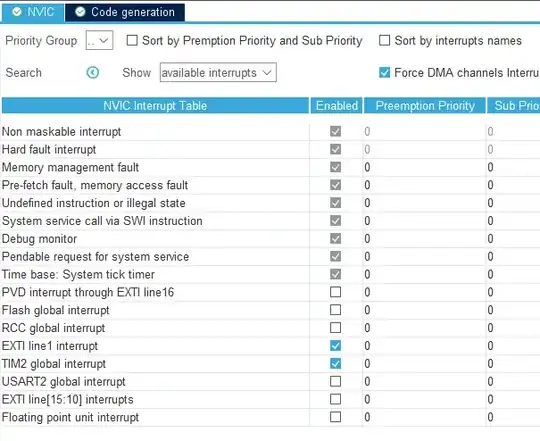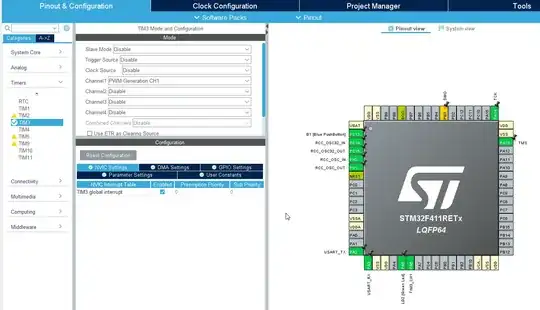I am using an STM32Cube IDE and HAL library to generate two PWM using two timers.
I want these two PWMs to stop i.e go LOW after one of the PWMs has generated N pulses.
I don't know what to use in what mode. Should I use a third timer with a mode or something else?
EDIT: After reading the answer, I'm getting closer but still some issues PWM does not stop.
Here is my settings(NUCLEO-F302R8):
I set PA0 as PWM output and PB1(myInterrupt_Input) as external trigger input.
Here my main.c:
/* USER CODE BEGIN Header */
/**
******************************************************************************
* @file : main.c
* @brief : Main program body
******************************************************************************
* @attention
*
* Copyright (c) 2022 STMicroelectronics.
* All rights reserved.
*
* This software is licensed under terms that can be found in the LICENSE file
* in the root directory of this software component.
* If no LICENSE file comes with this software, it is provided AS-IS.
*
******************************************************************************
*/
/* USER CODE END Header */
/* Includes ------------------------------------------------------------------*/
#include "main.h"
/* Private includes ----------------------------------------------------------/
/ USER CODE BEGIN Includes */
/* USER CODE END Includes */
/* Private typedef -----------------------------------------------------------/
/ USER CODE BEGIN PTD */
/* USER CODE END PTD */
/* Private define ------------------------------------------------------------/
/ USER CODE BEGIN PD /
/ USER CODE END PD */
/* Private macro -------------------------------------------------------------/
/ USER CODE BEGIN PM */
/* USER CODE END PM */
/* Private variables ---------------------------------------------------------*/
TIM_HandleTypeDef htim2;
UART_HandleTypeDef huart2;
/* USER CODE BEGIN PV */
/* USER CODE END PV */
/* Private function prototypes -----------------------------------------------/
void SystemClock_Config(void);
static void MX_GPIO_Init(void);
static void MX_USART2_UART_Init(void);
static void MX_TIM2_Init(void);
/ USER CODE BEGIN PFP */
/* USER CODE END PFP */
/* Private user code ---------------------------------------------------------/
/ USER CODE BEGIN 0 /
int global_pulse_flag = 0;
/ USER CODE END 0 */
/**
- @brief The application entry point.
- @retval int
/
int main(void)
{
/ USER CODE BEGIN 1 */
/* USER CODE END 1 */
/* MCU Configuration--------------------------------------------------------*/
/* Reset of all peripherals, Initializes the Flash interface and the Systick. */
HAL_Init();
/* USER CODE BEGIN Init */
/* USER CODE END Init */
/* Configure the system clock */
SystemClock_Config();
/* USER CODE BEGIN SysInit */
/* USER CODE END SysInit */
/* Initialize all configured peripherals /
MX_GPIO_Init();
MX_USART2_UART_Init();
MX_TIM2_Init();
/ USER CODE BEGIN 2 */
/* USER CODE END 2 */
/* Infinite loop /
/ USER CODE BEGIN WHILE /
while (1)
{
/ USER CODE END WHILE */
/* USER CODE BEGIN 3 */
}
/* USER CODE END 3 */
}
/**
- @brief System Clock Configuration
- @retval None
*/
void SystemClock_Config(void)
{
RCC_OscInitTypeDef RCC_OscInitStruct = {0};
RCC_ClkInitTypeDef RCC_ClkInitStruct = {0};
/** Initializes the RCC Oscillators according to the specified parameters
- in the RCC_OscInitTypeDef structure.
/
RCC_OscInitStruct.OscillatorType = RCC_OSCILLATORTYPE_HSI;
RCC_OscInitStruct.HSIState = RCC_HSI_ON;
RCC_OscInitStruct.HSICalibrationValue = RCC_HSICALIBRATION_DEFAULT;
RCC_OscInitStruct.PLL.PLLState = RCC_PLL_ON;
RCC_OscInitStruct.PLL.PLLSource = RCC_PLLSOURCE_HSI;
RCC_OscInitStruct.PLL.PLLMUL = RCC_PLL_MUL16;
if (HAL_RCC_OscConfig(&RCC_OscInitStruct) != HAL_OK)
{
Error_Handler();
}
/* Initializes the CPU, AHB and APB buses clocks
*/
RCC_ClkInitStruct.ClockType = RCC_CLOCKTYPE_HCLK|RCC_CLOCKTYPE_SYSCLK
|RCC_CLOCKTYPE_PCLK1|RCC_CLOCKTYPE_PCLK2;
RCC_ClkInitStruct.SYSCLKSource = RCC_SYSCLKSOURCE_PLLCLK;
RCC_ClkInitStruct.AHBCLKDivider = RCC_SYSCLK_DIV1;
RCC_ClkInitStruct.APB1CLKDivider = RCC_HCLK_DIV2;
RCC_ClkInitStruct.APB2CLKDivider = RCC_HCLK_DIV1;
if (HAL_RCC_ClockConfig(&RCC_ClkInitStruct, FLASH_LATENCY_2) != HAL_OK)
{
Error_Handler();
}
}
/**
- @brief TIM2 Initialization Function
- @param None
- @retval None
*/
static void MX_TIM2_Init(void)
{
/* USER CODE BEGIN TIM2_Init 0 */
/* USER CODE END TIM2_Init 0 */
TIM_ClockConfigTypeDef sClockSourceConfig = {0};
TIM_MasterConfigTypeDef sMasterConfig = {0};
TIM_OC_InitTypeDef sConfigOC = {0};
/* USER CODE BEGIN TIM2_Init 1 */
/* USER CODE END TIM2_Init 1 /
htim2.Instance = TIM2;
htim2.Init.Prescaler = 640-1;
htim2.Init.CounterMode = TIM_COUNTERMODE_UP;
htim2.Init.Period = 1000;
htim2.Init.ClockDivision = TIM_CLOCKDIVISION_DIV1;
htim2.Init.AutoReloadPreload = TIM_AUTORELOAD_PRELOAD_DISABLE;
if (HAL_TIM_Base_Init(&htim2) != HAL_OK)
{
Error_Handler();
}
sClockSourceConfig.ClockSource = TIM_CLOCKSOURCE_INTERNAL;
if (HAL_TIM_ConfigClockSource(&htim2, &sClockSourceConfig) != HAL_OK)
{
Error_Handler();
}
if (HAL_TIM_PWM_Init(&htim2) != HAL_OK)
{
Error_Handler();
}
sMasterConfig.MasterOutputTrigger = TIM_TRGO_RESET;
sMasterConfig.MasterSlaveMode = TIM_MASTERSLAVEMODE_DISABLE;
if (HAL_TIMEx_MasterConfigSynchronization(&htim2, &sMasterConfig) != HAL_OK)
{
Error_Handler();
}
sConfigOC.OCMode = TIM_OCMODE_PWM1;
sConfigOC.Pulse = 500;
sConfigOC.OCPolarity = TIM_OCPOLARITY_HIGH;
sConfigOC.OCFastMode = TIM_OCFAST_DISABLE;
if (HAL_TIM_PWM_ConfigChannel(&htim2, &sConfigOC, TIM_CHANNEL_1) != HAL_OK)
{
Error_Handler();
}
/ USER CODE BEGIN TIM2_Init 2 */
/* USER CODE END TIM2_Init 2 */
HAL_TIM_MspPostInit(&htim2);
}
/**
- @brief USART2 Initialization Function
- @param None
- @retval None
*/
static void MX_USART2_UART_Init(void)
{
/* USER CODE BEGIN USART2_Init 0 */
/* USER CODE END USART2_Init 0 */
/* USER CODE BEGIN USART2_Init 1 */
/* USER CODE END USART2_Init 1 /
huart2.Instance = USART2;
huart2.Init.BaudRate = 38400;
huart2.Init.WordLength = UART_WORDLENGTH_8B;
huart2.Init.StopBits = UART_STOPBITS_1;
huart2.Init.Parity = UART_PARITY_NONE;
huart2.Init.Mode = UART_MODE_TX_RX;
huart2.Init.HwFlowCtl = UART_HWCONTROL_NONE;
huart2.Init.OverSampling = UART_OVERSAMPLING_16;
huart2.Init.OneBitSampling = UART_ONE_BIT_SAMPLE_DISABLE;
huart2.AdvancedInit.AdvFeatureInit = UART_ADVFEATURE_NO_INIT;
if (HAL_UART_Init(&huart2) != HAL_OK)
{
Error_Handler();
}
/ USER CODE BEGIN USART2_Init 2 */
/* USER CODE END USART2_Init 2 */
}
/**
- @brief GPIO Initialization Function
- @param None
- @retval None
*/
static void MX_GPIO_Init(void)
{
GPIO_InitTypeDef GPIO_InitStruct = {0};
/* GPIO Ports Clock Enable */
__HAL_RCC_GPIOC_CLK_ENABLE();
__HAL_RCC_GPIOF_CLK_ENABLE();
__HAL_RCC_GPIOA_CLK_ENABLE();
__HAL_RCC_GPIOB_CLK_ENABLE();
/Configure GPIO pin Output Level /
HAL_GPIO_WritePin(LD2_GPIO_Port, LD2_Pin, GPIO_PIN_RESET);
/Configure GPIO pin : B1_Pin /
GPIO_InitStruct.Pin = B1_Pin;
GPIO_InitStruct.Mode = GPIO_MODE_IT_FALLING;
GPIO_InitStruct.Pull = GPIO_NOPULL;
HAL_GPIO_Init(B1_GPIO_Port, &GPIO_InitStruct);
/Configure GPIO pin : myInterrupt_Input_Pin /
GPIO_InitStruct.Pin = myInterrupt_Input_Pin;
GPIO_InitStruct.Mode = GPIO_MODE_IT_RISING;
GPIO_InitStruct.Pull = GPIO_NOPULL;
HAL_GPIO_Init(myInterrupt_Input_GPIO_Port, &GPIO_InitStruct);
/Configure GPIO pin : LD2_Pin /
GPIO_InitStruct.Pin = LD2_Pin;
GPIO_InitStruct.Mode = GPIO_MODE_OUTPUT_PP;
GPIO_InitStruct.Pull = GPIO_NOPULL;
GPIO_InitStruct.Speed = GPIO_SPEED_FREQ_LOW;
HAL_GPIO_Init(LD2_GPIO_Port, &GPIO_InitStruct);
/* EXTI interrupt init*/
HAL_NVIC_SetPriority(EXTI1_IRQn, 0, 0);
HAL_NVIC_EnableIRQ(EXTI1_IRQn);
}
/* USER CODE BEGIN 4 /
void HAL_TIM_PWM_PulseFinishedCallback(TIM_HandleTypeDef htim)
{
if(htim -> Instance == TIM2)
{
if(htim->Channel == HAL_TIM_ACTIVE_CHANNEL_1)
{
global_pulse_flag++;
if(global_pulse_flag>55){
global_pulse_flag = 0;
HAL_TIM_PWM_Stop_IT(&htim2,TIM_CHANNEL_1);
}
}
}
}
/* USER CODE END 4 */
/**
- @brief This function is executed in case of error occurrence.
- @retval None
/
void Error_Handler(void)
{
/ USER CODE BEGIN Error_Handler_Debug /
/ User can add his own implementation to report the HAL error return state /
__disable_irq();
while (1)
{
}
/ USER CODE END Error_Handler_Debug */
}
#ifdef USE_FULL_ASSERT
/**
- @brief Reports the name of the source file and the source line number
where the assert_param error has occurred.
- @param file: pointer to the source file name
- @param line: assert_param error line source number
- @retval None
/
void assert_failed(uint8_t file, uint32_t line)
{
/* USER CODE BEGIN 6 /
/ User can add his own implementation to report the file name and line number,
ex: printf("Wrong parameters value: file %s on line %d\r\n", file, line) /
/ USER CODE END 6 /
}
#endif / USE_FULL_ASSERT */
Here is stm32f3xx_it.c:
/* USER CODE BEGIN Header */
/**
******************************************************************************
* @file stm32f3xx_it.c
* @brief Interrupt Service Routines.
******************************************************************************
* @attention
*
* Copyright (c) 2022 STMicroelectronics.
* All rights reserved.
*
* This software is licensed under terms that can be found in the LICENSE file
* in the root directory of this software component.
* If no LICENSE file comes with this software, it is provided AS-IS.
*
******************************************************************************
*/
/* USER CODE END Header */
/* Includes ------------------------------------------------------------------/
#include "main.h"
#include "stm32f3xx_it.h"
/ Private includes ----------------------------------------------------------/
/ USER CODE BEGIN Includes /
/ USER CODE END Includes */
/* Private typedef -----------------------------------------------------------/
/ USER CODE BEGIN TD */
/* USER CODE END TD */
/* Private define ------------------------------------------------------------/
/ USER CODE BEGIN PD */
/* USER CODE END PD */
/* Private macro -------------------------------------------------------------/
/ USER CODE BEGIN PM */
/* USER CODE END PM */
/* Private variables ---------------------------------------------------------/
/ USER CODE BEGIN PV */
/* USER CODE END PV */
/* Private function prototypes -----------------------------------------------/
/ USER CODE BEGIN PFP */
/* USER CODE END PFP */
/* Private user code ---------------------------------------------------------/
/ USER CODE BEGIN 0 */
/* USER CODE END 0 */
/* External variables --------------------------------------------------------/
extern TIM_HandleTypeDef htim2;
/ USER CODE BEGIN EV */
/* USER CODE END EV */
/****************************************************************************/
/* Cortex-M4 Processor Interruption and Exception Handlers */
/**************************************************************************/
/
- @brief This function handles Non maskable interrupt.
/
void NMI_Handler(void)
{
/ USER CODE BEGIN NonMaskableInt_IRQn 0 */
/* USER CODE END NonMaskableInt_IRQn 0 /
/ USER CODE BEGIN NonMaskableInt_IRQn 1 /
while (1)
{
}
/ USER CODE END NonMaskableInt_IRQn 1 */
}
/**
- @brief This function handles Hard fault interrupt.
/
void HardFault_Handler(void)
{
/ USER CODE BEGIN HardFault_IRQn 0 */
/* USER CODE END HardFault_IRQn 0 /
while (1)
{
/ USER CODE BEGIN W1_HardFault_IRQn 0 /
/ USER CODE END W1_HardFault_IRQn 0 */
}
}
/**
- @brief This function handles Memory management fault.
/
void MemManage_Handler(void)
{
/ USER CODE BEGIN MemoryManagement_IRQn 0 */
/* USER CODE END MemoryManagement_IRQn 0 /
while (1)
{
/ USER CODE BEGIN W1_MemoryManagement_IRQn 0 /
/ USER CODE END W1_MemoryManagement_IRQn 0 */
}
}
/**
- @brief This function handles Pre-fetch fault, memory access fault.
/
void BusFault_Handler(void)
{
/ USER CODE BEGIN BusFault_IRQn 0 */
/* USER CODE END BusFault_IRQn 0 /
while (1)
{
/ USER CODE BEGIN W1_BusFault_IRQn 0 /
/ USER CODE END W1_BusFault_IRQn 0 */
}
}
/**
- @brief This function handles Undefined instruction or illegal state.
/
void UsageFault_Handler(void)
{
/ USER CODE BEGIN UsageFault_IRQn 0 */
/* USER CODE END UsageFault_IRQn 0 /
while (1)
{
/ USER CODE BEGIN W1_UsageFault_IRQn 0 /
/ USER CODE END W1_UsageFault_IRQn 0 */
}
}
/**
- @brief This function handles System service call via SWI instruction.
/
void SVC_Handler(void)
{
/ USER CODE BEGIN SVCall_IRQn 0 */
/* USER CODE END SVCall_IRQn 0 /
/ USER CODE BEGIN SVCall_IRQn 1 */
/* USER CODE END SVCall_IRQn 1 */
}
/**
- @brief This function handles Debug monitor.
/
void DebugMon_Handler(void)
{
/ USER CODE BEGIN DebugMonitor_IRQn 0 */
/* USER CODE END DebugMonitor_IRQn 0 /
/ USER CODE BEGIN DebugMonitor_IRQn 1 */
/* USER CODE END DebugMonitor_IRQn 1 */
}
/**
- @brief This function handles Pendable request for system service.
/
void PendSV_Handler(void)
{
/ USER CODE BEGIN PendSV_IRQn 0 */
/* USER CODE END PendSV_IRQn 0 /
/ USER CODE BEGIN PendSV_IRQn 1 */
/* USER CODE END PendSV_IRQn 1 */
}
/**
- @brief This function handles System tick timer.
/
void SysTick_Handler(void)
{
/ USER CODE BEGIN SysTick_IRQn 0 */
/* USER CODE END SysTick_IRQn 0 /
HAL_IncTick();
/ USER CODE BEGIN SysTick_IRQn 1 */
/* USER CODE END SysTick_IRQn 1 */
}
/****************************************************************************/
/* STM32F3xx Peripheral Interrupt Handlers /
/ Add here the Interrupt Handlers for the used peripherals. /
/ For the available peripheral interrupt handler names, /
/ please refer to the startup file (startup_stm32f3xx.s). */
/****************************************************************************/
/**
- @brief This function handles EXTI line1 interrupt.
/
void EXTI1_IRQHandler(void)
{
/ USER CODE BEGIN EXTI1_IRQn 0 /
if(HAL_TIM_PWM_Start_IT(&htim2, TIM_CHANNEL_1) != HAL_OK)
{
Error_Handler();
}
/ USER CODE END EXTI1_IRQn 0 /
HAL_GPIO_EXTI_IRQHandler(myInterrupt_Input_Pin);
/ USER CODE BEGIN EXTI1_IRQn 1 */
/* USER CODE END EXTI1_IRQn 1 */
}
/**
- @brief This function handles TIM2 global interrupt.
/
void TIM2_IRQHandler(void)
{
/ USER CODE BEGIN TIM2_IRQn 0 */
/* USER CODE END TIM2_IRQn 0 /
HAL_TIM_IRQHandler(&htim2);
/ USER CODE BEGIN TIM2_IRQn 1 */
/* USER CODE END TIM2_IRQn 1 */
}
/* USER CODE BEGIN 1 */
/* USER CODE END 1 */
